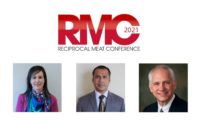The American Meat Science Association (AMSA) is pleased to announce, Drs. Eric Berg, Adegbola Adesogan, and Naima Moustaid-Moussa will be the featured speakers in the symposium entitled “Meat in Our Diet and Relationships between such Phenomena as Meat Consumption, Healthiness, Health, and Social Care” on Wednesday, August 18, 2021 during the 74th AMSA Reciprocal Meat Conference (RMC) hybrid meeting. This session will be sponsored by Corbion.
Dr. Eric Berg, Professor of Animal Sciences at North Dakota State University, will kick off this session with “A Salute to PVT TIM HiLL: Indispensable Amino Acids and Global Human Health.” Those of us who took animal nutrition during our undergraduate years likely learned the handy study mnemonic PVT TIM HiLL. This is an acronym for the nine indispensable amino acids 1) Phenylalanine, 2) Valine, 3) Threonine, 4) Tryptophan, 5) Isoleucine, 6) Methionine, 7) Histidine, 8) Leucine, and 9) Lysine. Dr. Berg’s presentation will discuss what it means when human diets are deficient in one or more of these indispensable amino acids and how dieters who are only looking at the crude protein on the food label are not getting the full story about that particular food protein.
Professor of Animal Nutrition and Director of the University of Florida Food Systems Institute, Dr. Adegbola Adesogan, will continue this session with a talk titled “The Importance of Meat Consumption for Cognitive Development.” In this presentation Dr. Adesogan will describe the important role meat plays in preventing cognitive and physical stunting in infants and children due to the different readily available micronutrients and high-quality protein it contains.
Dr. Naima Moustaid-Moussa, Paul W. Horn Distinguished Professor in Nutritional Sciences and Founding Director of the Obesity Research Institute at Texas Tech University, will close this session discussing “Meat/Beef Protein Consumption and Metabolic Outcomes: Effects on Inflammation, Microbiome in Metabolic Diseases.” Meat/beef is an important dietary component and a vital source of macro- and micronutrients, and as such, plays a key role in metabolic health, growth, and development. Health concerns have also been raised due to the high meat consumption and its potential negative effects on overall health including cardiometabolic health. During this presentation Dr. Moustaid-Moussa will focus on the importance of meat as a dietary component and its role in overall cardiometabolic health, and how different types of meat differentially impact overall metabolism.
AMSA is an organization recognized for its unmatched competence and commitment to attracting and developing meat industry leaders and providing science-based meat research and information. For more information, please visit www.meatscience.org/rmc or contact Deidrea Mabry 1-800-517-AMSA ext. 12.
Source: AMSA






